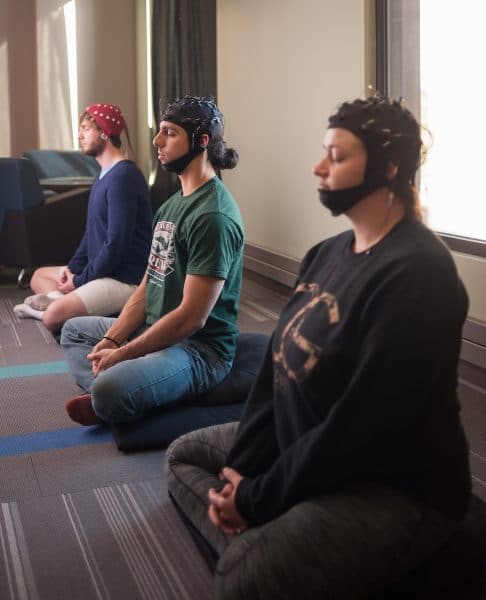Contemplative Psychophysiology Research Group
Lab Director: Robert J. Goodman, Ph.D.
Objective
The aim of the NAU Contemplative Psychophysiology Lab is to extend the scientific understanding of contemplative practices by examining how mindfulness and compassion influence emotion, memory, and the self. This research extends into applied domains, including geriatric care and education. Accordingly, the research conducted in the CPR Lab explores two intersecting lines of research. First, we examine the relation between mindful awareness and the regulation and experience of emotions, particularly under conditions of threat. Second, we examine the relation between mindfulness and memory-related processes, such as the content and accuracy of memory, and the subjective experience of remembering. For more information about current research opportunities, please see the CPR-Lab website.
Note: Asterisks denote NAU student coauthors.
Completed work
Selected peer-reviewed publications & scholarly chapters Accordion Closed
Berry, D. R., Cairo, A. H., Goodman, R. J., Quaglia, J. T., & Green, J. D. and Brown, K. W. (2018). Mindfulness increases prosocial responses toward ostracized strangers through empathic concern. Journal of Experimental Psychology: General, 147, 93-112 [2016 5-year ISI impact factor: 5.12]
Goodman, R. J., Plonski, P.*, Savery, L.N.* (2018). Compassion training from an Early Buddhist perspective: The neurological concomitants of the Brahmavihāras. In L.C. Stevens and C. C. Woodruff (Eds.) The Neuroscience of Compassion, Self-Compassion, and Empathy. Elsevier.
West, T. N.*, Savery, L. N.*, & Goodman, R. J. (2018). The Neuroscience of Cruelty. In L.C. Stevens and C. Woodruff (Eds.) The Neuroscience of Compassion, Self-Compassion, and Empathy. Elsevier.
Brown, K. W., Goodman, R. J., Ryan, R. M., & Anālayo, Bh. (2016). Mindfulness enhances episodic memory performance: Evidence from a multimethod investigation. PLoS One. doi:10.1371/journal.pone.0160280 [2014 5-year ISI impact factor: 3.70].
Goodman, R. J., Quaglia, J. T., & Brown, K. W. (2015). Burning Issues in Dispositional Mindfulness Research. For invited chapter in B.D. Ostafin, M.D. Robinson, & B.P. Meier (Eds.) Mindfulness and Self-Regulation. Springer.
Selected scholarly presentations Accordion Closed
Jung, E. A.*, & Goodman, R.J. (February 2019). Exploring the cognitive and emotional content of recognition memory following mindfulness. A poster to be presented at the annual meeting for the Society for Personality and Social Psychology, Portland, OR.
Al-Kire, M.*, Weidler, D., & Goodman, R. J. (February 2019). Primed and Prejudiced: Examining the Effects of Priming Religious Exemplars on Prejudice Toward Muslims. A poster to be presented at the annual meeting for the Society for Personality and Social Psychology, Portland, OR.
Goodman, R. J. (November 2018). From Nasty to Neighborly: The Intra- and Interpersonal Benefits of Meeting Disgust with Mindfulness. Symposium Chair. A Symposium presented at the 2018 International Symposium of Contemplative Research, Phoenix, AZ.
Goodman, R. J., Plonski, P. E.*, & Cutler, J.* (November 2018). Mindfulness Training Modifies Late Positive Potential Responses to Disgust. A paper presented at the 2018 International Symposium of Contemplative Research, Phoenix, AZ.
Goodman, R. J., & West, T. N.* (November 2018). Mindfulness Training Reduces Self-Serving Performance Attributions. A paper presented at the 30th annual meeting of the Association for Psychological Science, San Francisco, CA.
West, T. N.*, & Goodman, R. J. (November 2018). Mindfulness modifies the relation between the error related negativity and negative affectivity following self-threat. A poster presented at the 2018 International Symposium of Contemplative Research, Phoenix, AZ.
Terrizzi Jr., J. A., & Goodman, R. J. (July 2018). Tidiness of Mind: The Evolutionary Embodied Cognitive Consequences of Disgust. A poster presented at the annual meeting of the Human Behavior and Evolution Society. Amsterdam, Netherlands.
Goodman, R. J., Plonski, P. E.*, & Terrizzi Jr., J. A. (February 2018). Short-term Mindfulness Training Dampens Neural Responses to Disgust. A poster presented at the annual meeting of the Society for Personality and Social Psychology, Atlanta, GA.
Diamond, C.*, Esposito, M. V.*, & Goodman, R. J. (July 2017). Self-Compassion Reduces the Influence of Experiential Shame on the Self-Serving Bias. A symposium presented at the annual meeting of the American Psychological Association, Washington, DC.
Pondy, T.*, Esposito, M. V.*, & Goodman, R. J. (July 2017). Mindfulness, Self-enhancement, and Self-Evaluation Accuracy. A symposium presented at the annual meeting of the American Psychological Association, Washington, DC.
Recent thesis projects successfully defended Accordion Closed
Plonski, P. E. (November 2018) – Comparing Satipaṭṭhāna-Style Mindfulness and Progressive Muscle Relaxation Meditation on Neural Responses to Disgust and Unpleasant Emotion.
Esposito, M. V. (May 2017) – Effects of a Brief Mindfulness Induction on Self-Evaluation Accuracy.
West, T. N. (May 2017) – Quiet Ego Processes and the Modulation of a Neural Marker of Self-Centric Motivation.
